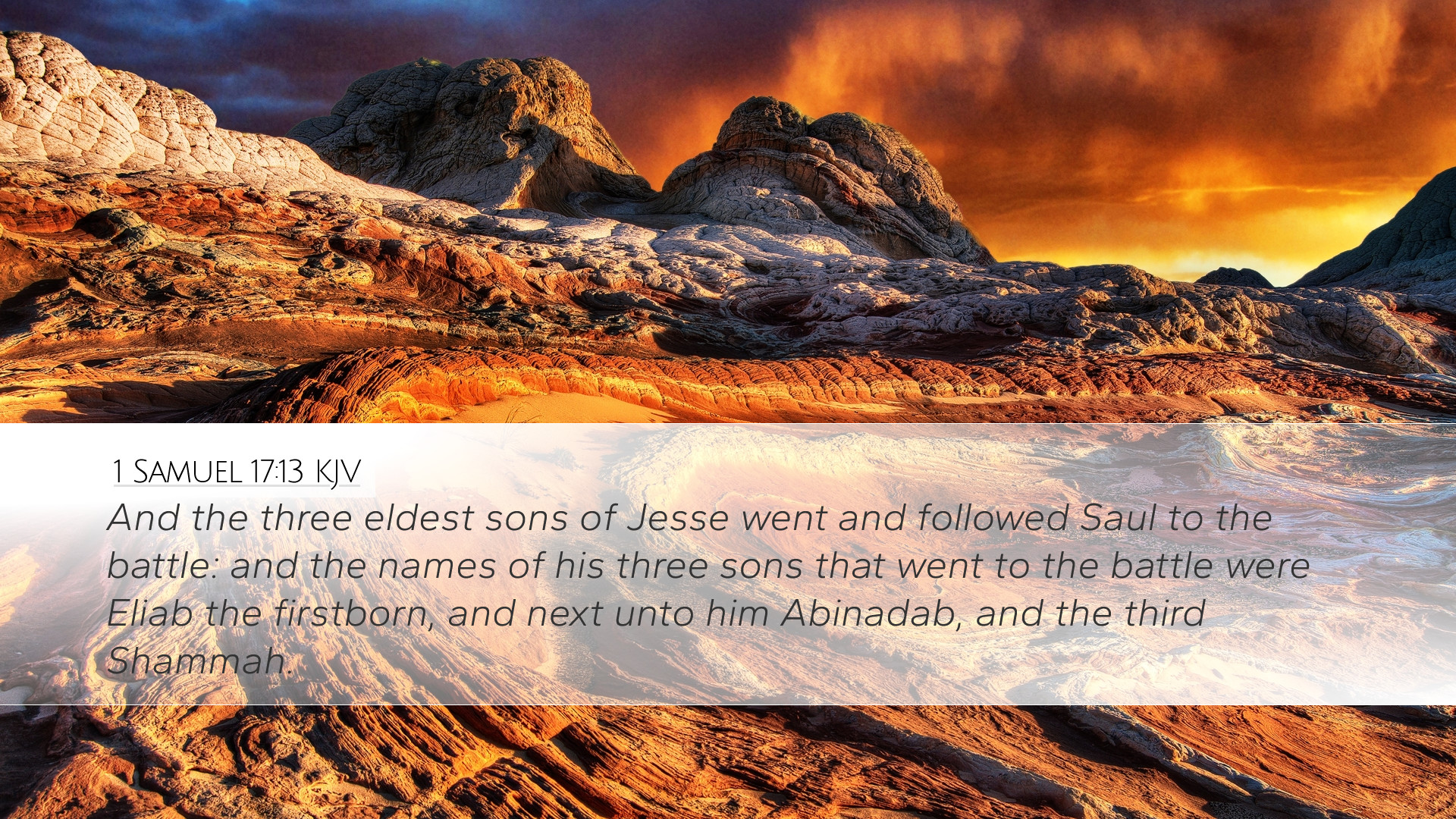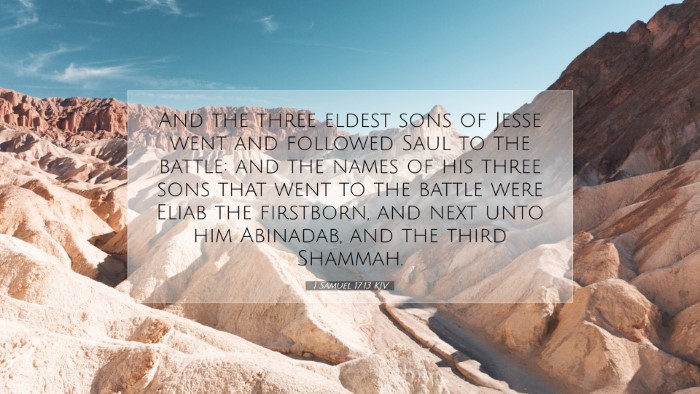Commentary on 1 Samuel 17:13
Bible Verse: 1 Samuel 17:13 - "And the three eldest sons of Jesse went and followed Saul to the battle: and the names of his three sons that went to the battle were Eliab the firstborn, and next unto him Abinadab, and the third Shammah."
Contextual Overview
The narrative found in 1 Samuel 17 unfolds the famous encounter between David and Goliath. This verse sets the stage by introducing the three eldest sons of Jesse, who accompanied King Saul to battle. Understanding the background of these characters is important for grasping the significance of Israel's military context at this pivotal moment in biblical history.
The Sons of Jesse
The focus on Jesse’s three sons serves a dual purpose: it highlights Jesse's family in the unfolding drama and foreshadows David's rise. The mention of the sons—Eliab, Abinadab, and Shammah—opens a window into the family lineage from which David, the future king, will emerge. They are not only fulfilling their duty as servants of the king, but they also represent the Israelite ideal of valor in battle.
Insights from Public Domain Commentaries
1. Matthew Henry’s Commentary
Matthew Henry emphasizes the importance of these men as part of God’s unfolding plan. He notes that the mention of the three brothers sets a contrast against the backdrop of Goliath's challenge, highlighting the fear that gripped the Israelite army.
Henry remarks on Eliab’s significant stature as the eldest, suggesting that familial expectations might weigh upon him, yet it is David, the youngest, who will ultimately demonstrate faith and courage where his elder brothers falter. This approach to leadership reveals God’s inclination to choose the humble and overlooked to achieve His purposes.
2. Albert Barnes’ Notes on the Bible
Albert Barnes provides historical context regarding the role of these three brothers. He explains that during the era of King Saul, the expectation for young men of stature was to serve in military campaigns, thus fulfilling familial and national duties.
Barnes observes that Eliab, as the firstborn, would naturally be viewed as the likely leader among his brothers. However, his later interactions with David highlight a deeper lesson on spiritual preparedness versus outward appearance. This theme reinforces the idea that God's criteria differ vastly from human judgment.
3. Adam Clarke’s Commentary
Adam Clarke delves into the significance of the names of the sons. He notes that "Eliab" means "God is my father," which may symbolize the divine authority that will ultimately be recognized throughout the narrative. "Abinadab" translates to "my father is noble," and "Shammah" means "appalled" or "desolated," which may reflect the emotional state of Israel facing Goliath's taunts.
Clarke argues that these names carry profound implications, suggesting that in times of great trial, the nobility of one's lineage and the recognition of divine guidance become pivotal in understanding identity and purpose within God's plan.
Spiritual Significance
This verse, while seemingly straightforward, holds rich theological insight. It illustrates key aspects of divine sovereignty, the nature of true courage, and the contrast between human expectation and divine selection.
- Divine Sovereignty: God's choice of David over his brothers serves as a reminder that God’s plans often defy human understanding (1 Samuel 16:7).
- Courage and Faith: The fear exhibited by Eliab and the others juxtaposes with David’s faith, demonstrating that true bravery emanates from trust in God rather than physical strength.
- Identity and Calling: The passage urges believers to recognize their identity as part of God’s family, much like the sons of Jesse, and to live out their calling with confidence, regardless of societal expectations.
Conclusion
1 Samuel 17:13 presents a vital point of transition in the biblical narrative. The introduction of Jesse’s sons places emphasis on familial dynamics, roles of leadership in Israel, and sets the stage for the emergence of David as God’s chosen servant. Each commentary affirms the theological richness present within this simple verse, inviting further reflection for pastors, students, theologians, and scholars alike. The narrative serves as a clarion call to all believers to trust in God’s unique calling, embracing the truth that God often chooses the seemingly insignificant to accomplish His greatest works.


